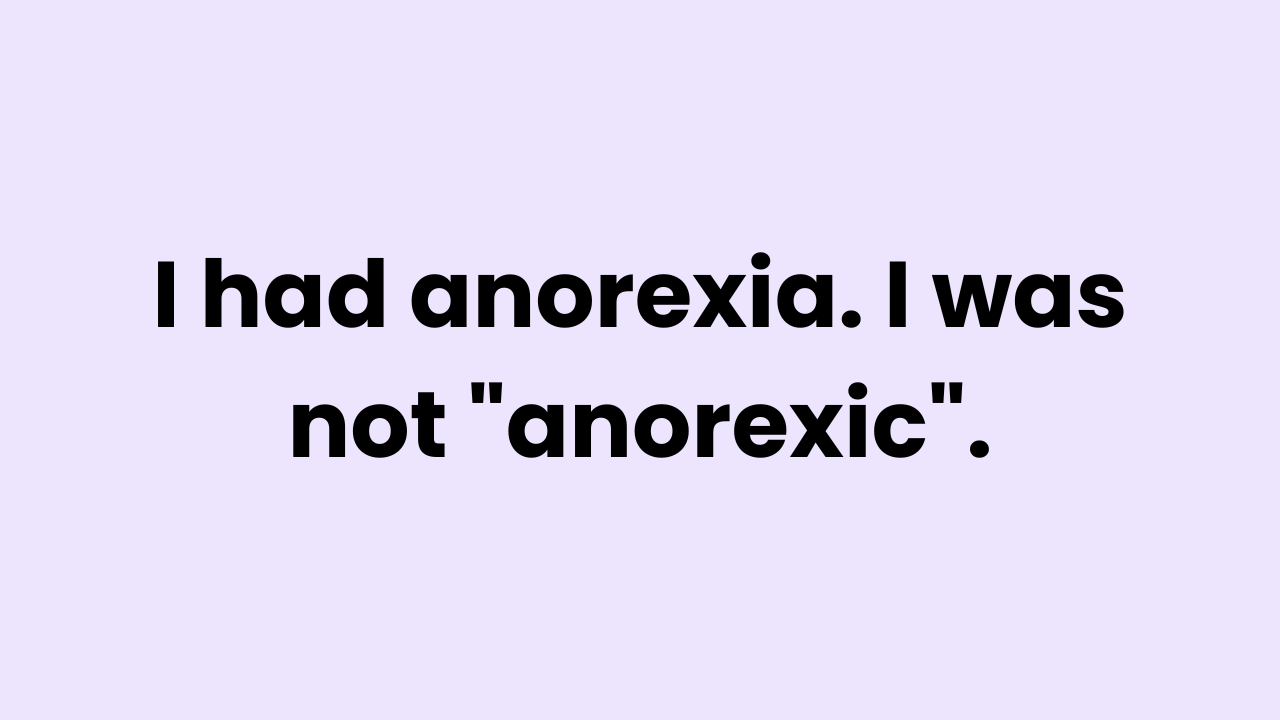I had anorexia. I was not "anorexic".
Jan 05, 2021
Who will I BE without my eating disorder? This is something I pondered for many years before finally committing to full recovery. Anorexia and Orthorexia had become part of my identity, such that my own thoughts were intertwined with my eating disorder thoughts. If my brain consisted of two ropes, my brain had become a knot that was infinitely tangled.
I know I'm not the only one who felt this way. Several of my 1:1 coaching clients and followers on Instagram tell me they're afraid to recover because they won't know what's left. They're afraid of feeling empty. The eating disorder makes them feel as if they are superior, by providing them with a goal and purpose in life...but this is just the tip of the paradox iceberg. Your eating disorder doesn't make you superior, it leads to a life that's inferior. It doesn't form your identity, it STRIPS you of one. Your smile, your laugh, your love for a certain sport or interest in reading fiction novels--it takes that from you and makes you obsessed with food, exercise, and numbers. Everything that makes you, you, your eating disorder will steal and hide in a locked box. Tell me then, how does the eating disorder make you special in any way?

I like to compare Anorexia to a virus. Why? Because it takes all your strengths--persistence, intelligence, maturity, insight--and uses them to its advantage. Just like a virus uses the RNA of its host to multiply, anorexia uses your body to manifest itself and uses those beautiful qualities to engrain itself. I feel it's this comparison that allows not only the sufferer, but also parents, physicians, and loved ones to understand why it's the "smart ones" that develop anorexia. Whenever I wouldn't (or rather, couldn't) eat, I was bombarded with questions such as:
"You're SO smart! How could you be SO dumb as to not eat when you're this sick?"
or
"You KNOW how damaging overexercise is! How can you be so ignorant as to run all the time?"
or even remarks as
"If only you would put the same amount of effort you put into your schoolwork into eating."
What's fallacious about these remarks is that the latter half of each, is completely irrelevant to the first part of the sentence. YOU are not dumb for not eating. The EATING DISORDER has a smart way of making you not eat. YOU are not ignorant. The EATING DISORDER has a clever way of convincing you to exercise. And lastly, it's not that YOU don't put effort into eating. It's that the EATING DISORDER puts effort into making you restrict. See where I'm getting at? The eating disorder has hijacked your own qualities and used them to its advantage.

When you understand that the eating disorder is not you, but simply a part of you, it opens the doors to taking back the power over your life and your decisions. Making the eating disorder your identity is taking on a victim role, because it sets you up to believe that there's nothing you can do about it. However, separating the eating disorder from your identity is taking an ownership mindset. This seems like a perfect time to look at the virus example again, so let's call the virus Covid (because isn't that so fitting right now?).
If you get Covid-19, you have Covid. You are infected with Covid. You are not Covid. Because you know that Covid is in your body but that you have an immune system to fight it off, you take measures to ensure your immune system can do that: you rest & allow yourself to heal. Adopting this same approach is critical in eating eating disorder recovery, because it opens your mind to understand that you can only heal if you give your body rest & take all the necessary measures to fight off the illness.

Earlier this week I shared a post about autism, in which I explained why most autistic people prefer identity-first language; "I am autistic" instead of "person with autism". Autism is a disability, making it a part of one’s identity. We are autistic, making everything we do autistic. People often don't prefer the term "person with autism" because we simply don't "have" autism; it's not some handbag that we carry around and toss on the couch when we've had enough. Anorexia, on the other hand, is not a disability. It's a disorder. A disorder is something you have, meaning it's also something you can get rid of.
When I committed to recovery over 4 years ago, externalizing my eating disorder was incredibly empowering. Realizing that I was not my disorder and that it was completely separate from the true Livia, opened the gates to taking ownership and fighting that beast like my life depended on it (because it did!). That said, your recovery is your responsibility. It can be really tempting to say "I got my eating disorder, which I can't do anything about...so I guess I'm just stuck with it". Yet again, this is being a victim. If someone threw a rock on your foot, you wouldn't say "oh well, there's nothing I can do about it". It's not your fault your foot got broken, but it's your responsibility to go to the doctor and take extra care of your broken foot. When you do so, your foot will heal. It's the same with your eating disorder: it's not your fault you got an eating disorder, but it's your responsibility to recover. In time, you will heal <3




